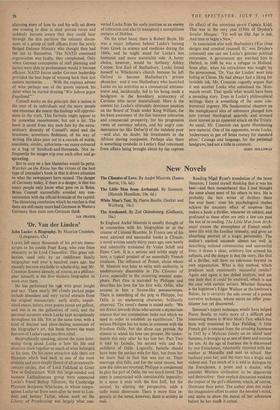'Dr. Van der Linden'
LOCKE left many thousands of his private manu- scripts to his cousin Peter King, who rose from obscurity to be Lord Chancellor. This great col- lection, used only by an indifferent family biographer well over a hundred years ago, has recently become available to scholarship, and Mr. Cranston (known already, of course, as a philoso- pher himself) is the first modern biographer to work over them.
He has performed his task with great insight and tact. These nearly 500 closely packed pages include abundant and very varied extracts from the original manuscripts: early drafts, unpub- ished essays, letters, even poems (some are gallant, and one is on the gallantries of cats), and the personal accounts which Locke kept scrupulously. throughout his life. Yet at the same time, with a kind of discreet and plain-dealing minimum of the biographer's art, this book throws the main features of Locke's case into firm relief.
Biographically speaking, almost the most inter- esting thing about Locke is how his life and situation draw together so much of what belonged to his time. On his more attractive side there are filaments which lead back to one of the most amiable and most deeply liberal of all seventeenth- century circles, that of Lord Falkland at Great Tew in Oxfordshire. With this large-minded and humane Latitudinarian group were connected Locke's friend Bishop Tillotson; the Cambridge Platonist Benjamin Whichcote, in whose congre- gation Locke sat from soon after he went to Lon- don; and Jeremy Taylor, whose work on the Liberty of Prophesying was largely what con-
verted Locke from his early position as an enemy of toleration and also (it transpires) a surreptitious imitator of Hobbes.
On the other hand, there is Robert Boyle. He was a major influence behind Locke's turning from Greek to science and medicine during the 1660s, and he might stand for Locke's less humanist and more materialist side. A better choice, however, would be Anthony Ashley Cooper, first Earl of Shaftesbury. Locke found himself in Whichcote's church because he left Oxford to become Shaftesbury's private physician : and it was Shaftesbury who launched Locke on his activities as a commercial adminis- trator and, incidentally, led to his being made a landgrave in the hereditary aristocracy of Carolina (this never materialised). Here is the context for Locke's ultimately dominant position on the Board of Trade under King William, for his keen awareness of the link between toleration and commercial prosperity, for his progressive views of currency reform, and his angry con- demnation (so like Defoe's) of the indolent poor —and also, no doubt, his investments in the African slaving companies. Perhaps also there is something symbolic in Locke's final retirement from affairs being brought about by the capture
(in effect) of the notorious pirate Captain Kidd. This was in the very year (1700) of Dryden's Secular Masque: 'Tis well an Old Age is out, And time to begin a New.'
In association also with Shaftesbury (Tor close designs and crooked counsels fit,' was Dryden's comment) one can see Locke's genuine political extremism. A government spy watched him in Oxford, in 1680 he was a refugee to Holland. Soon after, when his extradition was sought by the government, `Dr. Van der Linden' went into hiding at Cleves. He had always had a liking for invisible ink. Mr.• Cranston cogently argues that it was another Locke who subsidised the Mon- mouth revolt. That spoils what would have been a revealing story. Even in Locke's philosophical writings there is something of the same con- troversial urgency. His fundamental chapters on the metaphysical idea of substance plunged him into current theological quarrels, and aroused most interest as an apparent attack on the Trinity. As usual, Mr. Cranston can quote illuminating new material. One of his opponents, wrote Locke, 'endeavours to put off brass money for standard silver.' Coinage and language, for the perpetual landgrave, had not a little in common.
'JOHN HOLLOWAY














































 Previous page
Previous page